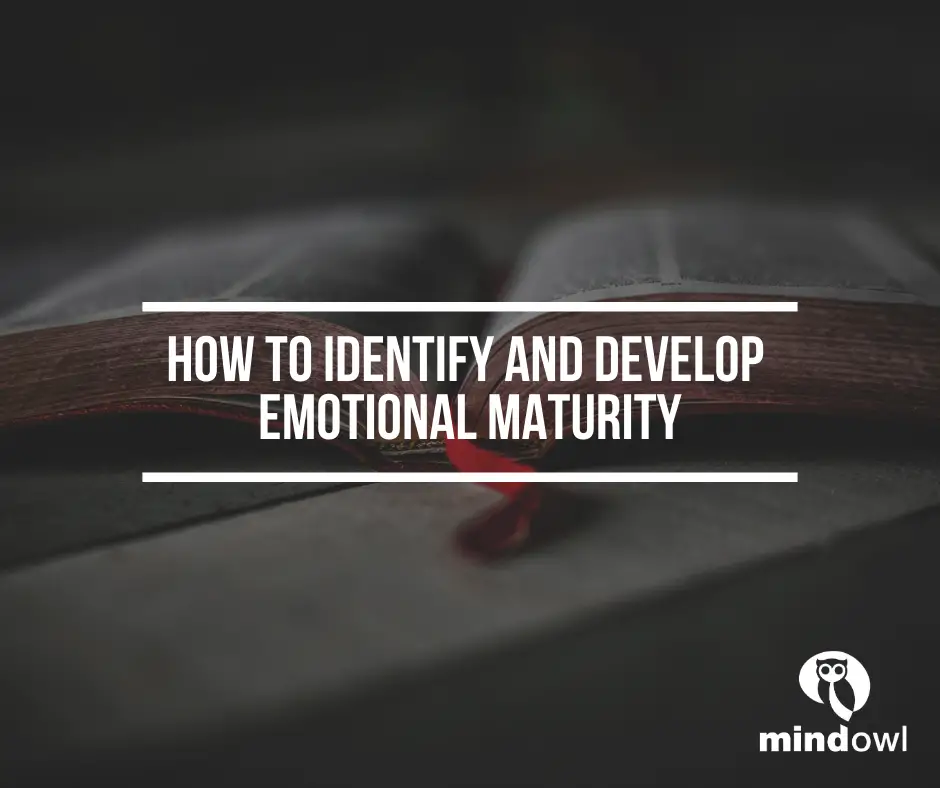Emotional maturity is a prerequisite for a contented life and can be a pivotal factor in how we deal with the world around us. So what is this magical character trait and how can it be achieved?
What is emotional maturity?
When we think about maturity, the first thing that comes to mind is usually age. However, when it comes to emotional maturity, the age of a person is not always an accurate indicator. Instead, emotional maturity relates to an individual’s ability to both manage and understand their emotions. There are many dimensions to emotional maturity, but to put it simply, emotional maturity helps us to cope with the difficult situations life throws at us. As such, being emotionally mature can help one to navigate the modern world and find fulfilment and happiness within it.
On the flip side, if you’re wondering ‘what is emotional immaturity?’ this is also an important question. It can be difficult to identify emotional immaturity in a person at first, but as relationships develop this can become a factor that is challenging to deal with. In this article, we take a look at some key pointers that will help you to identify emotional maturity in yourself and others. We will also explore some practices that can help you to cultivate an active awareness of your emotions and help you to develop your emotional maturity.

it also shows that you are not quick to blame others for your own mistakes.”
How to identify emotional maturity
1. Having an awareness of where you came from
No matter how much we may try to deny it, we are profoundly affected by our surroundings and environment. Where we grew up, our family background and our community all influence our inert biases and prejudices. Having an awareness of how these biases, prejudices and potential privileges influence decisions and actions is a key indicator of emotional maturity. Through this awareness, emotionally mature people are better able to see the world from a different perspective and question themselves when they think their ingrained beliefs may be tainting their viewpoint.
2. Being able to admit when you are wrong and taking responsibility for your actions
While it is not easy to admit when you’re wrong, another key sign of emotional maturity is the ability to do so. Admitting when you are wrong not only demonstrates that you take responsibility for your own actions, it also shows that you are not quick to blame others for your own mistakes. An obsession with always being right, no matter what the cost, is an indicator of emotional immaturity. Apologising takes courage, and in recognising our own weaknesses, we can demonstrate our emotional intelligence.
The same goes for receiving criticism, an emotionally mature person is able to receive criticism and not take it as a personal attack. Rather, they can take the feedback on board and aim to learn from it instead.
3. Practising self-forgiveness and not dwelling on past mistakes
The ability to admit when you are wrong goes hand in hand with letting go of previous mistakes. Rather than punishing yourself for what went wrong in the past, or clinging to feelings of regret, a key aspect of emotional maturity is learning to let go. You recognise that constantly punishing yourself for previous errors is counter-intuitive and, instead, realise that you are only human and forgive yourself. Being kind to yourself is a key part of emotional maturity and allows you to learn from mistakes rather than dwelling on them. Indeed, forgiving yourself for past mistakes is an important step in achieving a contented life not least because when we make mistakes we tend to learn a lot from them.
4. Showing empathy to others
As well as being kind to themselves, people with high levels of emotional maturity demonstrate equal kindness to others. This is done through the ability to empathise, as well as being able to show care and consideration for the feelings of those around you. In the same way that an emotionally mature person is aware of their own prejudices and biases, they are also able to see when specific circumstances and challenges affect the actions of others. It is often easy to spot an emotionally mature person as people are naturally drawn to them thanks to their ability to listen without judgement and show empathy to others.
5. Being honest with yourself and asking for help
A large part of emotional maturity comes from being in tune with your emotions and being honest with yourself about how you are feeling. It is incredibly tempting to ignore feeling a particular emotion or memory that we find uncomfortable and even painful. However, in doing so, we banish these emotions from our psyche and allow them to take control of us in different ways. Emotional maturity means acknowledging that perfection is impossible, everyone is partial to feeling difficult emotions such as fear, anger, and embarrassment. The most important thing is to be honest with yourself about what you’re feeling and not being afraid to ask for help in times of difficulty.
6. Taking a calm approach and rationalising fears and anxieties
It is impossible to never feel anxious or afraid, however, it is how we deal with these emotions that determine our level of emotional maturity. If anxiety is controlling your activities or thought patterns this can have a severe effect on your well-being. While it is certainly not easy, a sign of increasing emotional maturity is not always envisaging the worst-case scenario. Being emotionally mature means that you can rationalise feelings of anxiety and fear by recognising that sometimes things do go wrong, but largely you can get through these difficult times and there is always a plan B whatever the situation you are facing.
7. The ability to detach your emotions from your reactions
As we have learned, a great deal of emotional maturity comes from being aware of, and having a handle on, your emotions. This ability can have a profound effect on your interactions with others as, instead of feeling an emotion and reacting immediately, you are able to create a distance between your initial emotion and your immediate reaction.
This ability to react more carefully is an example of practising mindfulness in your day to day life as you observe your initial emotion, recognise it, and think about how you should react rather than allowing your instinct to dictate your response and saying the first thing that comes to mind. This practice can go a long way towards maintaining positive relationships and is both a sign, and huge benefit, of being an emotionally intelligent and mature person.
How to develop emotional maturity
If you’ve got this far in the article and have found that some of the points above do not ring true for you, this certainly does not make you a bad person. Rather, that you are on the long journey to achieving emotional maturity. In this next section, we take a look at some helpful ways to become more emotionally mature.
The benefits of practising mindfulness cannot be praised enough. Mindfulness can help you to become more in tune with your thoughts and feelings and help you to gain control of them. It can also help you to appreciate the smaller things in life and take the pressure off yourself if you’re constantly aspiring for perfection.
2. Consider previous reactions
When thinking about our emotional maturity level it can often bring to mind times in our lives which we are not proud of. Perhaps previous arguments we’ve had, negative opinions we’ve held about others, or times when we’ve allowed fears and anxieties to get the better of us. While this can be uncomfortable, it can be helpful to think about these situations and practice emotional maturity retrospectively. Through personal reflexivity, we can gain an awareness of our own prejudices and biases and even recognise how empathy could have altered your reaction.
3. Be open to learning
A key part of growing in emotional maturity is being open to learning. An emotionally mature person recognises that they do not know everything and that there is (always) so much more to learn and gain from others around them. It is okay to not have the answers to everything and admit that we need guidance from time to time, be it from a therapist, teacher or a friend. Opening your mind to others will allow you to grow in more ways than one.
Emotional maturity has several dimensions. It not only means having awareness and control over one’s own emotions, prejudices, biases, and privileges it also means showing empathy and compassion to the feelings and reactions of those around us. Achieving emotional maturity is no easy feat. It can mean addressing some parts of ourself which we have previously chosen to ignore, admitting to previous mistakes, and being honest about our true thoughts and feelings. However, it also means being kind to yourself and letting go of the things you regret.
Growing in emotional maturity can have a profound effect on your own well-being, as well as having a positive effect on your relationships with others. Practising mindfulness, learning from past experiences, and opening your mind to learning something new are key steps in the right direction in achieving emotional maturity.
MindOwl Founder – My own struggles in life have led me to this path of understanding the human condition. I graduated with a bachelor’s degree in philosophy before completing a master’s degree in psychology at Regent’s University London. I then completed a postgraduate diploma in philosophical counselling before being trained in ACT (Acceptance and commitment therapy).
I’ve spent the last eight years studying the encounter of meditative practices with modern psychology.


One thought on “Emotional maturity: how to identify and develop”